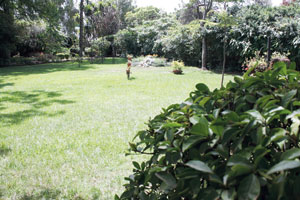By Hosea Omole
A good lawn does more than improve a garden’s aesthetics. It also provides a multi-functional surface that supports a wide range of outdoor activities. Lawns also serve as a background upon which other garden design elements are embedded. In addition, they visually connect and unify different parts of the garden.
Yet, lawns are probably some of the most stressful landscape features to keep in top notch condition. They demand lots of regular and articulate care just to stay in reasonable condition. The good news, however, is that challenges of maintenance can be drastically reduced by planning your lawn well. Moreover, the benefits accrued from a well planned lawn are often worth the hustle.
Resist the temptation to have more lawn than you really need. Pre-determine the quality of lawn you need and how the lawn will be used. Also remember that different lawn types require varying amounts of care. All these factors should be taken into consideration during the planning stages of the lawn.
Whether you are improving an existing lawn or planning a new one, here are some tips to guide you through.
Mowing
There is more to mowing your lawn than walking around it behind a noisy machine. You need to determine a few things. The height of the lawn, for instance, depends on the type of grass you have. In any case, never cut more than a third of the grass’ leaf blades. That means you should not let the grass grow too long before mowing it. Determine the growth rate of your grass type and make a strict schedule for mowing it.
 |
A well cared for lawn
|
If you are using a lawn mower, vary your mowing tracks every time you cut the grass. Using the same track patterns leads to ‘wheel tracks’ forming in the soil. These accumulate water and cause fungal growth and disease. Also ensure that the blades of your mower are kept sharp to avoid them ripping the grass thus making it unsightly and exposing it to diseases and pests.
Watering
Most lawns will need about one inch of water per week. This should be applied all at once to encourage deep rooting and reduce wastage. Shallow frequent watering only encourages weed growth. You can measure one inch by using a watering gauge or placing a small can with a one-inch calibration in the lawn for the period of watering.
The most effective way to water lawns is by using sprinklers. There is a wide range to choose from depending on the size of your lawn as well as your budget. A simple hose sprinkler is often good enough for domestic applications. Also remember to water in the morning between 5am and 9am. That way, less of the water is wasted through evaporation and the grass has more time to partake of.
Fertilising
Organic feeding in the way of using manure often needs to be complemented with fertilisers. Understanding fertilisers is the key to using them effectively. Most fertilisers contain the three most important nutrients to plants — nitrogen, phosphorus and potassium. The proportions or analysis of these are often printed on the pack. For instance, a 10-10-10 fertiliser has equal proportions of each of the three nutrients.
The kind of fertiliser you choose to apply depends on your needs. For instance, a nitrogen rich fertiliser is best for greening up the grass while potassium is effective for root development and improving water retention. Also, take note of the other elements contained in the fertiliser. Calcium and magnesium, for instance, are important inclusions in lawn fertilisers.
Weed Control
Weeds are probably the lawn-keeper’s most annoying problem. Broad-leaved weeds such as plantain and dandelions are best dealt with by hand weeding. This is a lot of work for sure, but once the weed has been dug out with a knife or trowel, it is really gone for good, assuming that the digging is done before the weed has had a chance to mature and drop its seeds.
Chemical solutions are also available for dealing with weeds. Extensive use of inorganic chemicals is, however, not good for the environment. It is, therefore, advisable to always opt for organic solutions whenever you can avoid a chemical warfare.
The writer is a landscape architect
 The Standard Group Plc is a multi-media organization with investments in media
platforms spanning newspaper print operations, television, radio broadcasting,
digital and online services. The Standard Group is recognized as a leading
multi-media house in Kenya with a key influence in matters of national and
international interest.
The Standard Group Plc is a multi-media organization with investments in media
platforms spanning newspaper print operations, television, radio broadcasting,
digital and online services. The Standard Group is recognized as a leading
multi-media house in Kenya with a key influence in matters of national and
international interest.
 The Standard Group Plc is a multi-media organization with investments in media
platforms spanning newspaper print operations, television, radio broadcasting,
digital and online services. The Standard Group is recognized as a leading
multi-media house in Kenya with a key influence in matters of national and
international interest.
The Standard Group Plc is a multi-media organization with investments in media
platforms spanning newspaper print operations, television, radio broadcasting,
digital and online services. The Standard Group is recognized as a leading
multi-media house in Kenya with a key influence in matters of national and
international interest.










